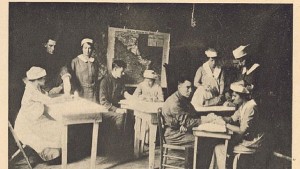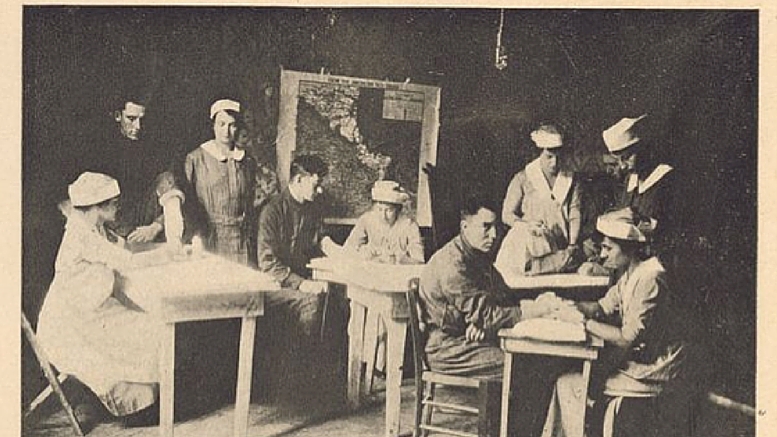
Nurses known as “Blue Birds” massaging joints at Base Hospital 43 in Blois, France. Credit: Courtesy Woodruff Health Sciences Center Library Historical Collection, Emory University.
In World War I, U.S. Army Surgeon General William Gorgas asked for medical professionals to volunteer for the war effort, and doctors and nurses from Emory University School of Medicine and Grady Memorial Hospital answered the call. The Atlanta recruits established the WWI Base Hospital 43 in Blois, France in 1918. It was known as the “Emory Unit,” because so many members were affiliated with the university.
Since volunteer medical units proved so successful in WWI, the unit was again called to service during World War II and operated the 43rd General Hospital.
The WWI unit was led by Dr. Edward Campbell Davis, co-founder of the Davis-Fischer Sanatorium (now Emory University Hospital Midtown). Davis had served as a surgeon during the Spanish-American War.
Approximately 24 officers, 65 nurses, 154 enlisted personnel and six French civilians made up Base Hospital 43 in WWI. They operated a 500-bed, often-overflowing hospital for six months and treated more than 9,000 patients in that time.
On their days off, the doctors conducted seminars on what they were learning about the treatment of patients suffering from nerve (mustard) gas exposure and chemical wounds.
Led by Dr. Daniel C. Elkin (first chair of the Emory University Department of Surgery) and later, Dr. Ira A. Ferguson, the reactivated Grady/Emory unit trained at Camp Livingston, Louisiana for a year and then served in Oran, Algeria, Naples, Italy, and Southern France during WWII.
Since its inception, Emory University School of Medicine has played a significant role in research, patient care, and medical education—in Atlanta and across the world. For more than a century, the partnership between Emory and Grady has cultivated a community that enriches, changes, and saves lives.
Related Links/Sources
• The Legacy of Emory at Grady: Notable Firsts
• When the Emory Unit Went to War
• Raising the Bar: 150 Years of a Medical School in Motion
• Grady Health System
• Emory University School of Medicine
• Emory University Department of Medicine
• Jordan Messler’s April 2015 presentation at Medicine Grand Rounds
• A Marriage Made in Atlanta
• Emory at Grady

